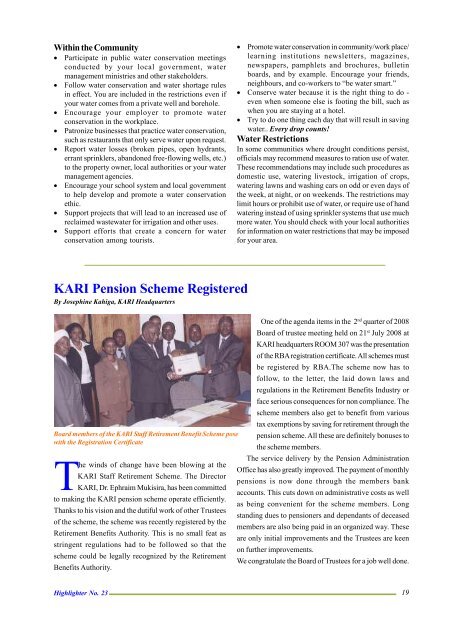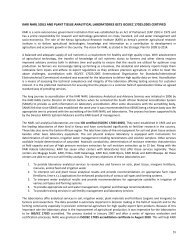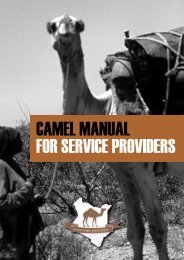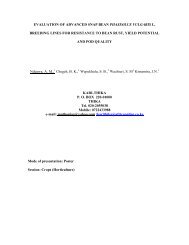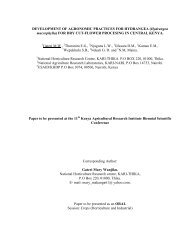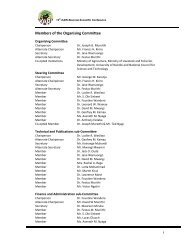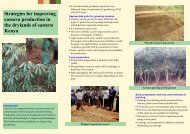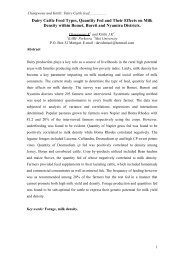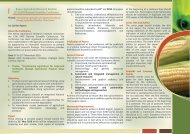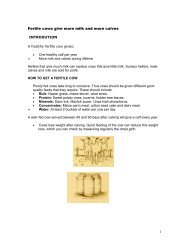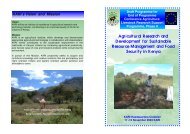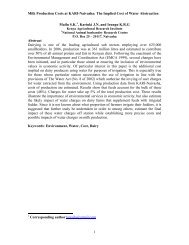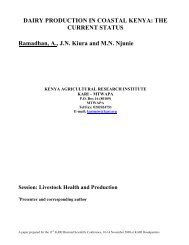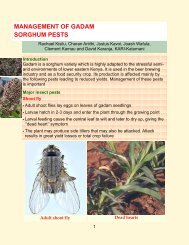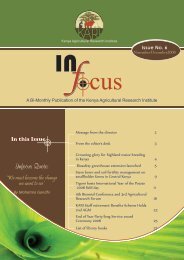January - June 2008 - Kenya Agricultural Research Institute
January - June 2008 - Kenya Agricultural Research Institute
January - June 2008 - Kenya Agricultural Research Institute
Create successful ePaper yourself
Turn your PDF publications into a flip-book with our unique Google optimized e-Paper software.
Within the Community<br />
• Participate in public water conservation meetings<br />
conducted by your local government, water<br />
management ministries and other stakeholders.<br />
• Follow water conservation and water shortage rules<br />
in effect. You are included in the restrictions even if<br />
your water comes from a private well and borehole.<br />
• Encourage your employer to promote water<br />
conservation in the workplace.<br />
• Patronize businesses that practice water conservation,<br />
such as restaurants that only serve water upon request.<br />
• Report water losses (broken pipes, open hydrants,<br />
errant sprinklers, abandoned free-flowing wells, etc.)<br />
to the property owner, local authorities or your water<br />
management agencies.<br />
• Encourage your school system and local government<br />
to help develop and promote a water conservation<br />
ethic.<br />
• Support projects that will lead to an increased use of<br />
reclaimed wastewater for irrigation and other uses.<br />
• Support efforts that create a concern for water<br />
conservation among tourists.<br />
• Promote water conservation in community/work place/<br />
learning institutions newsletters, magazines,<br />
newspapers, pamphlets and brochures, bulletin<br />
boards, and by example. Encourage your friends,<br />
neighbours, and co-workers to “be water smart.”<br />
• Conserve water because it is the right thing to do -<br />
even when someone else is footing the bill, such as<br />
when you are staying at a hotel.<br />
• Try to do one thing each day that will result in saving<br />
water.. Every drop counts!<br />
Water Restrictions<br />
In some communities where drought conditions persist,<br />
officials may recommend measures to ration use of water.<br />
These recommendations may include such procedures as<br />
domestic use, watering livestock, irrigation of crops,<br />
watering lawns and washing cars on odd or even days of<br />
the week, at night, or on weekends. The restrictions may<br />
limit hours or prohibit use of water, or require use of hand<br />
watering instead of using sprinkler systems that use much<br />
more water. You should check with your local authorities<br />
for information on water restrictions that may be imposed<br />
for your area.<br />
KARI Pension Scheme Registered<br />
By Josephine Kahiga, KARI Headquarters<br />
Board members of the KARI Staff Retirement Benefit Scheme pose<br />
with the Registration Certificate<br />
The winds of change have been blowing at the<br />
KARI Staff Retirement Scheme. The Director<br />
KARI, Dr. Ephraim Mukisira, has been committed<br />
to making the KARI pension scheme operate efficiently.<br />
Thanks to his vision and the dutiful work of other Trustees<br />
of the scheme, the scheme was recently registered by the<br />
Retirement Benefits Authority. This is no small feat as<br />
stringent regulations had to be followed so that the<br />
scheme could be legally recognized by the Retirement<br />
Benefits Authority.<br />
One of the agenda items in the 2 nd quarter of <strong>2008</strong><br />
Board of trustee meeting held on 21 st July <strong>2008</strong> at<br />
KARI headquarters ROOM 307 was the presentation<br />
of the RBA registration certificate. All schemes must<br />
be registered by RBA.The scheme now has to<br />
follow, to the letter, the laid down laws and<br />
regulations in the Retirement Benefits Industry or<br />
face serious consequences for non compliance. The<br />
scheme members also get to benefit from various<br />
tax exemptions by saving for retirement through the<br />
pension scheme. All these are definitely bonuses to<br />
the scheme members.<br />
The service delivery by the Pension Administration<br />
Office has also greatly improved. The payment of monthly<br />
pensions is now done through the members bank<br />
accounts. This cuts down on administrative costs as well<br />
as being convenient for the scheme members. Long<br />
standing dues to pensioners and dependants of deceased<br />
members are also being paid in an organized way. These<br />
are only initial improvements and the Trustees are keen<br />
on further improvements.<br />
We congratulate the Board of Trustees for a job well done.<br />
Highlighter No. 23<br />
19


